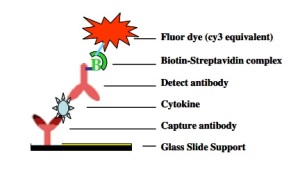The word “cancer” groups a series of diseases of different origin and different prognosis, with differentiated molecular mechanisms causing their onset and progression. Hence, discovery of novel biomarkers for each type of cancer, allowing to understand their underlying mechanisms and provide a specific (or even personalised) treatment is a fast-moving area of research.
In previous posts, we have described the finding of novel biomarkers for several types of cancer (e.g. esophageal, glioblastoma, pancreatic cancer, etc). Let’s take a look today at gastric cancer.
An antibody array has recently been launched, allowing to detect and quantify the levels of 5 biomarkers associated to gastric cancer (CA19-9, CA72-4, CEA, Pepsinogen 1 and Pepsinogen 2). The array is not intended for clinical use, but rather, as a valuable tool to study cohorts of patients and see the levels of these biomarkers in serum and other types of samples, in order to validate them as future clinical markers.
CA19-9 is a glycosylated protein that has traditionally been considered as a tumour biomarker. It is not specific to gastric cancer, as it can also be present in pancreas cancer. It is useful, however, to monitor disease progression in some cases.
CA72-4 is another glyosylated protein, a bit more specific for gastric cancer than CA19-9, though it can also be present in some types of ovarian cancer.
Detection of CA19-9 and CA72-4 can be done adding CEA to the pannel, which increases the sensitivity and specificity from 42 % to 57 %. CEA (Carcinoembryonic antigen) groups a series of very similar glycoproteins involved in cell adhesion.
Finally, pepsinogens are clear indicators of gastric disease, and ratio between pepsinogen I and II can have a clinical significance for many gastric disorders. Combination of all these 5 biomarkers can be a good way to study gastric cancer in a more specific way.
Which model are you working on? If you’re interested this antibody array, or in any other arrays for your biomarkers of interest, get in touch!



